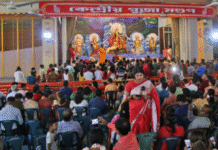

Last update on: Sun May 7, 2023 12:56 PM

International smugglers are bringing gold bars into Bangladesh through legal means and then smuggling those to India.
In Saudi Arabia, the United Arabia Emirates, and several other middle eastern countries and Singapore, the racketeers approach people travelling to Bangladesh and give them gold bars weighing not more than 234 grams, the maximum an individual can bring under the Baggage Rules-2016, said police and customs officers who have investigated gold smuggling cases for years.
Once the travellers arrive in Bangladesh, the local gang members receive the bars from them and smuggle those across the border.
The gangs pay the customs fee for the bars and give the carriers some money or even buy their plane tickets in return for the favour, investigators said.
The money needed to buy the bars are sent abroad through hundi since Bangladeshis are not allowed to travel abroad with more than $ 12,000 a year.
According to NBR data, people travelled to Bangladesh with at least 99,791 kg of gold from 2019 to 2022. At least 52,195 kg worth Tk 44,366 crore was brought in 2022 alone.
The government has received Tk 1,714 crores in duties from the gold.
Since the authorities do not keep an account of the amount of gold an individual brings every time they travel to Bangladesh, the smugglers can use the same person to bring gold over and over, investigators said.
Mohammad Fakhrul Alam, director general of the Customs Intelligence and Investigation Directorate (CIID), said individuals bringing gold to the country under the baggage rule have to pay less in taxes than the ones importing gold for business.
This is why the smugglers are able to work the system, he added.
Even the jewellery store owners prefer to buy gold bars from the travellers because it is cheaper, said Shamit Ghosh Apu, a member of Bangladesh Jewellers’ Association (Bajus).
Individuals bringing 234 grams of gold pay Tk 40,000 in customs fees, but someone importing the same amount of gold pays Tk 70,000 in taxes, customs officials said.
The customs directorate has written several times to the National Board of Revenue to set a limit on the number of times an individual can travel to Bangladesh with gold each year, Fakhrul said.
A top official of Dhaka Customs House said, “It has been suggested to the NBR that expatriate workers should be allowed to bring two gold bars no more than twice a year and tourists once a year. Besides, this should be included in their tax files,” said a top official of Dhaka Customs House, requesting anonymity.
Tohidul Islam, an additional deputy commissioner (airport zone) of Dhaka Metropolitan Police, said police were aware that a section of smugglers were using the legal means.
“We have got the names of several suspects. We are looking for them,” he added.
MONEY CHANGES HANDS THROUGH HUNDI
On March 19, CIID officers arrested a man arriving from Riyad named Junayed at Hazrat Shahjalal International Airport (HSIA) with 3.21kg of gold worth around Tk 1.47 crore.
He allegedly gathered the gold from carriers traveling along with him inside the terminal.
Police officers investigating the matter learnt that Junayed was used to receive the gold bars from travellers outside the airport. He has been involved in the racket for over three years, officers said, adding that he has at least 45 accounts with different banks.
An officer, requesting anonymity, said Junayed’s transactions for the smuggling were done over hundi.
Three other people were arrested by customs officials and police on March 27, April 25, and April 28 each with over 1kg of gold at the airport.
Police said the suspects’ activities in the racket were similar to those of Junayed’s.
Officials said gold instead of foreign currency arriving in the country was hurting the reserves. On top of this, the gold is usually smuggled to India.
AIR TICKETS PLUS POCKET MONEY
Police and Customs officials believe some people just simply travel to Dubai and Oman to be able to play the role of carriers for the smugglers. Besides gold bars, they also bring mobile phones and personal care products.
They get free plane tickets and up to Tk 30,000 in return for the favour, officers said.
This correspondent has talked to six men who said they took this as a profession.
Investigators said after making all the payments, the racketeers make a profit of about Tk 60,000 every time their carrier makes a trip.
According to the airport database from 2019-2022, around 91 percent of the gold brought to the country comes in the form of bars. Around 74 percent of it comes from the United Arab Emirates, 20 percent from Saudi Arabia and the rest from Bahrain, Oman, and Singapore, officials said.
Anwar Hossain, vice president of Bangladesh Jewellers’ Association (Bajus) told The Daily Star that Bangladeshi consumers buy around 18 to 20 tonnes and gold a year and most of it comes from gold brought under the baggage rule.
“Every year, gold bars and ornaments worth around Tk 73,000 crore come to Bangladesh under baggage rules. The money was supposed to be remitted by the migrants, but it arrives in the form of gold. This is deepening our dollar crisis,” said Anwar.
However, a large part of the gold that comes into the country legally and illegally is smuggled into India. They said that gold bars are used to pay for stolen or undeclared goods, a custom source said.
Shamit of Bajus said gold smugglers use Bangladesh as a transit because regulations on gold import are stricter in India.
Fakhrul Alam, the CIID DG said, “We have come to know that India is the destination of a large part of the legal and illegal gold. But who are the investors of these golds always remaining hidden.”
Mosiur Rahman, additional commissioner of Dhaka Customs House, told The Daily Star that there is a plan to open a help desk in the departure lounge of airports to check foreign currency endorsement to ensure transparency.
The Border Guard Bangladesh has seized around 33.79kg gold while those were being smuggled last month alone.









